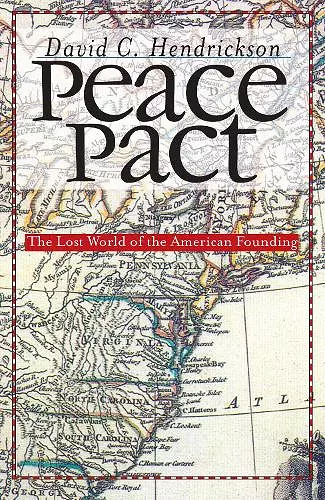Peace Pact
The Lost World of the American Founding
Format:Paperback
Publisher:University Press of Kansas
Published:30th Apr '03
Should be back in stock very soon

That New England might invade Virginia is inconceivable today. But interstate rivalries and the possibility of intersectional war loomed large in the thinking of the Framers who convened in Philadelphia in 1787 to put on paper the ideas that would bind the federal union together. At the end of the Constitutional Convention, Benjamin Franklin rejoiced that the document would "astonish our enemies, who are waiting to hear with confidence . . . that our States are on the point of separation, only to meet hereafter for the purpose of cutting one another's throats." Usually dismissed as hyperbole, this and similar remarks by other Founders help us to understand the core concerns that shaped their conception of the Union. By reexamining the creation of the federal system of the United States from a perspective that yokes diplomacy with constitutionalism, Hendrickson's study, according to Karl Walling, "introduces a new way to think about what is familiar to us."
This ground breaking book, then, takes a fresh look at the formative years of American constitutionalism and diplomacy. It tells the story of how thirteen colonies became independent states and found themselves grappling with the classic problems of international cooperation, and it explores the intellectual milieu within which that problem was considered. The founding generation, Hendrickson argues, developed a sophisticated science of international politics relevant both to the construction of their own union and to the foreign relations of "the several states in the union of the empire." The centrality of this discourse, he contends, must severely qualify conventional depictions of early American political thought as simply "liberal" or "republican."
Hendrickson also takes issue with conventional accounts of early American foreign policy as "unilateralist" or "isolationist" and insists that the founding generation belonged to and made distinguished contributions to the constitutional tradition in diplomacy, the antecedent of twentieth-century internationalism. He describes an American system of states riven by deep sectional animosities and powerful loyalties to colonies and states (often themselves described as "nations") and explains why in such a milieu the creation of a durable union often appeared to be a quixotic enterprise. The book culminates in a consideration of the making of the federal Constitution, here styled as a peace pact or experiment in international cooperation.
A complex and remarkable book that may well make an important paradigm shift in early American history.... Deftly combining intellectual, constitutional, and diplomatic history, Hendrickson significantly reorients our understanding of the creation of the American republic." —American Historical Review
"Hendrickson's masterly work immediately joins Peter S. Onuf and Nicholas G. Onuf's Federal Union, Modern World: The Law of Nations in an Age of Revolutions as one of the leading attempts to view the making of America in international perspective." —Journal of American History
"An exemplary contribution to our understanding of the early republic." —William and Mary Quarterly
"A remarkable book - engaging, learned, and well-written.... Highly recommended." —Choice
"A splendid and important book." —International History Review
"An extrordinary achievement." —Peter Onuf, author of Jefferson's Empire: The Language of American Nationhood
ISBN: 9780700614936
Dimensions: 237mm x 154mm x 22mm
Weight: 595g
402 pages